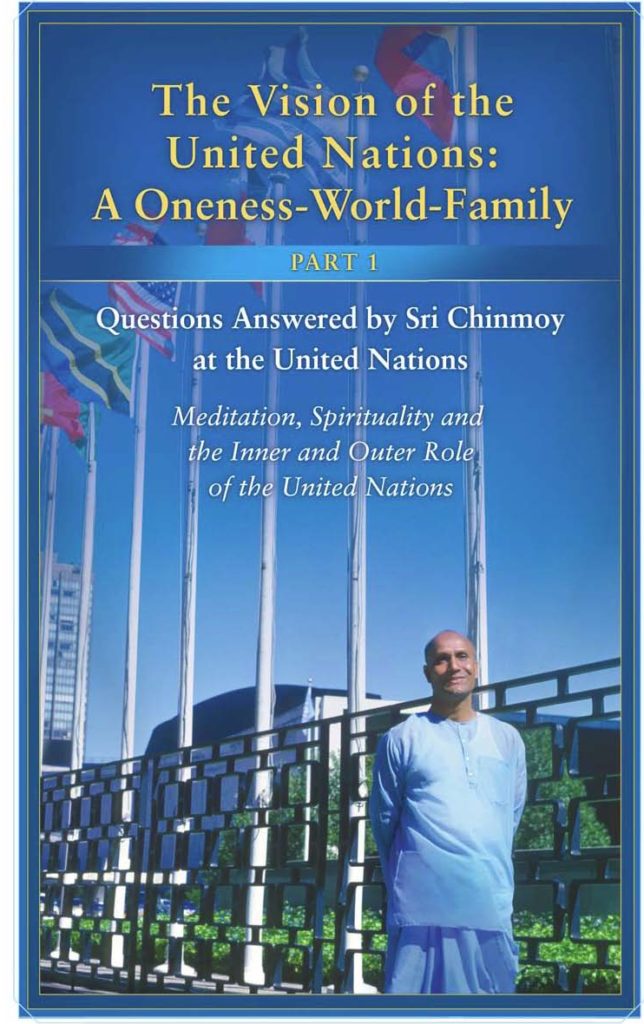
During his nearly four decades of service at United Nations Headquarters in New York, Sri Chinmoy was asked hundreds of questions on meditation, spirituality and the inner and outer role of the United Nations. Following are just a few excerpts from his illumining answers, which continue to offer great insight, wisdom and hope for a peaceful oneness-world. This selection of 50 questions and answers is presented in honour of the 50th anniversary of Sri Chinmoy: The Peace Meditation at the United Nations on 14 April 2020, and the 75th anniversary of the United Nations on 24 October 2020.
Celebrating 50 Years with 50 Questions
During his nearly four decades of service at United Nations Headquarters in New York, Sri Chinmoy was asked hundreds of questions on meditation, spirituality and the inner and outer role of the United Nations.
Following are just a few excerpts from his illumining answers, which continue to offer great insight, wisdom and hope for a peaceful oneness-world.
This selection of 50 questions and answers is presented in honour of the 50th anniversary of Sri Chinmoy: The Peace Meditation at the United Nations on 14 April 2020, and the 75th anniversary of the United Nations on 24 October 2020. The questions originally appeared in My Meditation-Service at the United Nations for 25 Years, published in 1995 and reprinted again in 2018. Question numbers from the 2018 printed edition and online version of My Meditation-Service at the United Nations are listed in the Contents for ease of reference to the original unabridged text.
This publication is a companion volume to The Vision of the United Nations: A Oneness-World-Family, Part 2, which contains excerpts from 50 talks offered by Sri Chinmoy at the United Nations. The booklet was also printed in honour of the 50th anniversary of the Peace Meditation Group
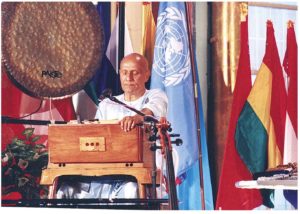
Sri Chinmoy performs his music on fifty instruments from various nations at a Peace Concert held in the UN General Assembly Hall Lobby on 23 May 1995, one of fifty free Concerts that he offered at the UN and other venues around the world throughout 1995 to commemorate the UN’s 50th Anniversary.
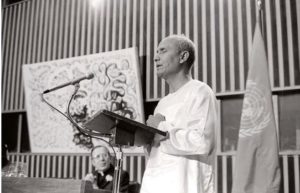
Sri Chinmoy at a Peace Meditation Group programme “Oneness-Earth” held at the UN on 14 December 1977.The event was filmed by CBS-TV and later broadcast. On display was Sri Chinmoy’s painting entitled “United Nations: the Heart-Home of the World-Body.” It was dedicated to United Nations efforts for peace, and prior to the programme it had been exhibited around the world as a proponent of goodwill and world-oneness.
e
Summarized List and reference to unabridged text
Questions and answers are summarized below by subject matter. Many of the questions and answers appearing in this booklet have been condensed from the original. For ease of reference to the original unabridged text, question numbers from the 2018 printed edition and the online version of My Meditation-Service at the United Nations (MUN) are listed after each entry below. The full text can be accessed on SriChinmoyLibrary.com/MUN. Specific questions can be called up by entering a dash and the question number (i.e., SriChinmoyLibrary.com/MUN-93 for the first question listed above and SriChinmoyLibrary.com/MUN-45 for the fifth question listed above.
Back to Top Button

Back to Top Button
Use the “Back to Top” indicator on right column to return to Top :
Questions Answered
l. Most important thing to remember while working at the UN (MUN-93)
Question: What is the most important thing to remember while working at the United Nations?
Sri Chinmoy: The most important thing to remember while working at the United Nations is the vision of the United Nations. The vision of the United Nations is world peace and world harmony: one nation, one soul and one goal. While working at the United Nations, you have to sing all the time in the inmost recesses of your heart the oneness-song.
The most important thing to remember while working at the
United Nations is the vision of the United Nations.
– Sri Chinmoy
2. UN’s influence in the world and its principal contribution (MUN-2)
Dr. Robert Muller: Do you think the United Nations exercises a real influence in the world? What in your view is its principal contribution? How does it appear to you in the great stream of history and human evolution?*
Sri Chinmoy: Not only do I think, but it is my absolute inner conviction, that the United Nations exercises a real influence in the world. What it brings to the world are the vision of peace, the mission of brotherhood and the promise of total perfection and total satisfaction in the oneness-worId-family. The principal contribution of the United Nations is the hope-sky that it offers to the world at large. The seeker servers at the United Nations – no matter in which capacity they serve – and the supporter-lovers of the United Nations – no matter in which part of the world they live – are seeing a glimpse of this all-illumining revelation. And each glimpse embodies a growing and glowing fulness-satisfaction in their life of inner hunger and their life of outer feast.
In the stream of history and human evolution, the United Nations is to be not only the great and ultimate pathfinder of the ultimate truth but also the good and supreme bliss-distributor of humanity’s divinity.
*This and the following question are part of a series of 11 questions submitted to Sri Chinmoy in 1977 by Dr. Robert Muller, Director and Deputy to the Under-Secretary-General for Inter-Agency Affairs and Coordination at United Nations Headquarters in New York. Dr. Muller was later appointed United Nations Assistant Secretary-General and then served as Chancellor of the University for Peace .
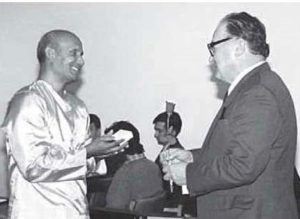
Assistant Secretary-General Robert Muller presents Sri Chinmoy with the UN 40th Anniversary Medal on 26 November 1985, at UN Headquarters. Highlighted here are some of Sri Chinmoy’s answers to a series of questions that Dr. Muller asked in 1977.
3. Synthesis between East and West (MUN-4)
Dr. Robert Muller: UN Secretary-General U Thant often said that in his view the West was too materialistic and intellectual, and not spiritual enough, whereas the East was too spiritual and fatalistic, and not caring enough for the material and intellectual welfare of people. Do you see a synthesis developing between the two, and how would you envisage a harmonious, happy world-society?
Sri Chinmoy: I readily, immediately and unreservedly agree with our beloved Secretary-General U Thant’s most illumining assessment of Eastern achievements and Western achievements, Eastern possessions and Western possessions, Eastern contributions and Western contributions, Eastern outlook towards reality and Western outlook towards reality.
We can endlessly observe the differences between the East and the West. But the real question is whether or not these differences are being synthesised. We can clearly see that the East has already gained consider able knowledge and wisdom from the West, especially in the scientific world. Again, the West has gained considerable knowledge and wisdom from the East, especially in the spiritual world. Here we see that the heart and the mind cannot function separately and individually. If they feel the need for integral perfection in life, they have to function together. The mind without the heart will not know what the supreme reality is. The heart without the mind will not know how the supreme reality can be manifested here on earth. To our great joy, the East and the West are constantly complementing each other to make each other perfect, at times consciously but more often unconsciously. Human divisions and distinctions – racial, cultural, linguistic and so on – are destined to disappear when the human consciousness is flooded with a higher light. Diversities will remain, but they will be enriched and enhanced in fullest measure. They will harmoniously complement the whole.
Human divisions and distinctions – racial, cultural, linguistic and so on – are destined to disappear when the human consciousness is flooded with a higher light. – Sri Chinmoy
Humanity will be a true human family in every sense of the term and also in a sense that the human mind has yet to discover. And here I wish to say that this discovery will exceed all human expectations.
The awakened consciousness of man is evolving towards the divine existence. This is a most hopeful streak of light amidst the obscurities of the present-day world. This is a moment when human beings will not only join hands but also join minds, hearts and souls. All physical, vital and mental barriers between East and West will dissolve, and high above national standards, above even individual standards, we shall see the supreme banner of divine oneness.
4. East-West political and North-South economic relations (MUN-20)
Question: Which is more important: East-West political relations or North-South economic relations?
Sri Chinmoy: Both are equally important. In both cases, what we need is a feeling of sympathetic concern, love and oneness. The political reality of one hemisphere should not try to dominate the political reality of another hemisphere. Again, the countries of the North and South have to realise that they can have satisfaction only when the rich countries offer their wealth to the poorer ones and when the poor accept this wealth with gratitude and not with a demanding attitude.
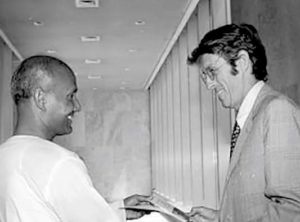
Mr. David Rowe, Political Advisor, United States Mission to the UN, with Sri Chinmoy after a Peace Meditation at UN Headquarters. Mr. Rowe submitted a series of questions that Sri Chinmoy answered in the Spring of 1977, two of which appear below.
5. Ancient dream of cooperation among all nations (MUN-45)
Mr. David Rowe: Cooperation among all nations is an ancient dream. Assuming we are building on the past, how can we assess the outlook now? 2
Sri Chinmoy: The ancient dream of cooperation is not just a human dream that has nothing to do with reality. This ancient dream, to be precise, is not a dream at all but an unhorizoned vision that is slowly, steadily and unerringly shaping our individual and collective destiny as humanity marches towards its supreme goal of universal oneness and transcendental newness.
This and the following question are part of a series of eight questions submitted to Sri Chinmoy by Mr. David Rowe, Political Advisor, United States Mission to the United Nations, in the Spring of 1977.
The world is constantly evolving towards a higher standard of life. It is not moving in a straight line, but rather in a spiral. There fore, at times this progress is not immediately noticeable. But on the strength of our inner oneness with the world situation and world evolution, we can see unmistakably the world’s slow and steady progress.
True, man-made destructive forces are everywhere. Here they may be found in small measure; somewhere else, in large measure. But the creator of these destructive forces need not remain always a creator of wrong forces; he can easily become a creator of good forces.
The ancient dream – nay, the ancient vision – of cooperation will always remain new and progressive, for creation itself is an ever-transcending reality. – Sri Chinmoy
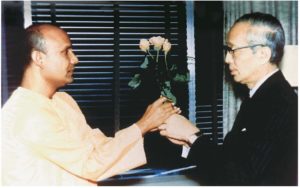
Sri Chinmoy offers UN Secretary-General U Thant a bouquet of flowers at a meeting with the Secretary-General at UN Headquarters in New York on 29 February 1972, when U Thant said, “Whoever speaks to me about you is all appreciation and admiration, and I personally feel that you have been doing a most significant task for the United Nations. Please feel my sincere respect and sincere concern for what you are doing for mankind.”
A negative force is not negative by nature; it is only a force that we use in a negative way. With a knife one can stab others; with the same knife one can cut fruits and share them with others.
The first step in turning a negative force into a positive force is to remain silent long enough to catch a glimpse either consciously or unconsciously of the divine, illumining and fulfilling light. The second step is to bring this light forward and create positive realities that will accelerate humanity’s progress towards perfection.
The ancient dream – nay, the ancient vision – of cooperation will always remain new and progressive, for creation itself is an ever-transcending reality. If we can open our heart’s door and our mind’s windows, we will be able to see from our body-room the illumining and fulfilling light all around us. Then only we shall discover continual progress in humanity’s march along eternity’s road to infinity’s satisfaction-goal.
6. When a Member State assumes an “anti-UN attitude” (MUN-41)
Mr. David Rowe: When a Member State assumes an” anti-United Nations attitude”, it is probably due to frustration or fear that the United Nations has taken or may take some action against it. Does such an attitude weaken the United Nations system?
Sri Chinmoy: When a Member State assumes an “anti-United Nations attitude”, it undoubtedly weakens the United Nations system on the outer plane. But on the inner plane the strength of the United Nations system is extremely solid and sound. As long as the inner aspiration of the United Nations is sincere and strong, we do not have to worry if some Member States, or even all the Member States, go against the United Nations system. For it is not the Member States alone that will bring about world harmony. It is the united force of all the nations, big and small, that can and will bring about a oneness-world-family.
There may be many reasons why a Member State wants to stand against United Nations policy. But just by standing against United Nations policy, a State will not be able to solve even an iota of the world’s problems. If one sees that the United Nations is doing something wrong, that is no reason to stand violently and shamelessly against the United Nations. One has to love the United Nations more in order to bring to the fore its sincere aspirations, for this alone is what can and will change the face of the entire world
7. Best way to deal with people actively opposed to the UN (MUN-15)
Question: How do we best deal with people who are actively opposed to the United Nations?
Sri Chinmoy: We have to deal with people who are actively opposed to the United Nations with perseverance, tolerance and forgiveness.
If we have perseverance, then we have made a first step towards world harmony. If we have tolerance, then we have put forward the second step. And if we can forgive, then we have made the third and ultimate step. With these three qualities we can eventually illumine those who are actively opposed to the ideas and ideals of the United Nations.
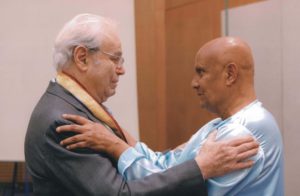
Sri Chinmoy presents an award to UN Secretary-General Javier Pérez de Cuéllar in Paris on 26 May 2005, when the Secretary- General said, “I am deeply honoured to receive this Award from Sri Chinmoy, a very distinguished and loved friend for many, many years. What is happening to me now is that I am receiving the inspiration of Sri Chinmoy, who is actually, I would say, the heart of the United Nations – because in all the years I was Secretary- General, and even before I was Secretary-General, he was always with us. Even if he was not present, his message was with us, and we were, as I said before, being inspired by him.”
8. Gap between UN ideals and routine daily life in Secretariat (MUN-138)
Question: What can be done about the large gap between the high ideals of the United Nations and routine daily life in the Secretariat offices?
Sri Chinmoy: Indeed, there is often a large gap, a yawning gulf, between the high ideals of the United Nations and the daily experiences of those who work in the Secretariat. The vision is high, higher, highest – reaching to the ever-transcending height. The reality is often discouraging and disheartening.
Right now we have only a vague idea of what the future will be like. This idea is a product of our mind. But we have to transcend the idea-world in order to enter into the ideal-world, that is to say, the world of illumining and fulfilling ideals. The ideal world that beckons us is far above and far beyond our present day vision.
Just because today there is often a yawning gulf between vision and reality, between our idea of the future and the ideal that actually awaits us, we cannot say that we shall always be doomed to failure. No, we must continue to strive for perfection.
Each individual, either consciously or unconsciously, has sown the seeds of hope. This hope is inseparably one with each individual’s inner cry, which we call aspiration.
The vision of the soul of the United Nations and of all those who are consciously aspiring for a new oneness-world, a world of unity, will never fail.
Each time we pray and meditate at the United Nations, let us energise our hope. When we dive deep within, let us try to remind ourselves of the lofty promise that we are carrying. When hope and promise work together, fulfilment cannot remain a far cry.
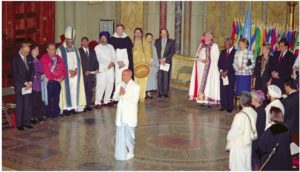
Secretary-General Kofi Annan (second from the right)) joins as Sri Chinmoy gives the silent invocation for the Solemn Interfaith Service of Commitment to the Work of the UN honouring the Secretary-General, held at St. Bartholomew’s Church in New York City on 25 April 1997. On 22 September 2000, Kofi Annan wrote to Sri Chinmoy: “Let me take this opportunity to express my appreciation for your 30 years of dedication to the United Nations. Through your prayers, meditations, concerts and global ‘Peace Run’, your work has linked peace-lovers in more than 100 countries and complemented that of the world Organization.”
9. Need for guidance in meditation (MUN-259)
Mrs. Mohini Singh, wife of C.P.N. Singh, Member of Parliament, India: When you sit down to meditate, there are times when you reach a very quiet sort of place and all the sounds seem distant. It has happened to me and I felt, at times, that I needed some kind of guidance, which was not available immediately. Do you think that one can meditate by oneself without somebody there who can help you at every step?3
Sri Chinmoy: If one wants to go to Rome from New York, one can go by plane and one can go also by other means. It is up to the seeker to decide if he wants to take the fastest way or not. In the spiritual life a teacher represents the fastest way. If we have a teacher, our journey will be expedited far beyond our imagination. A spiritual teacher is like a tutor. An ordinary teacher will examine the student and then pass him or fail him. But it is the bounden responsibility of the tutor to teach the student privately so that he will pass the examination.
‘ Sri Chinmoy answered this question during a special meditation for delegates held at United Nations Headquarters in New York on 11 November 1983.
A spiritual teacher says, “Here is the key. It will open the safe where your inner treasure is hidden.” It is not the teacher’s safe. It is your safe, all yours. The treasure is within you, but you have unfortunately misplaced the key that will unlock the safe where the diamond is kept.
What concentration can do in our day-to-day life is unimaginable.
Concentration is the surest way to reach our goal.
– Sri Chinmoy
A teacher will be able to tell us whether or not we are doing proper meditation. Otherwise, although we are doing extremely well, wrong forces may come and take away all our joy by telling us that our meditation is just mental hallucination. Again, sometimes we may fool ourselves. At that time a sincere teacher will show us that we are not meditating well.
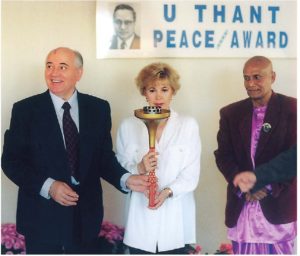
President Mikhail Gorbachev and Raisa Maximovna meet with Sri Chinmoy on 16 October 1994 in New York. On 15 August 2001, President Gorbachev wrote to Sri Chinmoy: “Your enormous and significant activities are helping people to live better lives in peace, friendship and love… Everyone knows and highly appreciates your work at the United Nations. Indeed, you are connected with the whole world, and your work is to foster peace-making efforts and the spiritual development of humanity… Whatever you dedicate yourself to – art, music, poetry, drawing – all this is connected with peace, peace amongst people and peace amongst nations.”
Sometimes it happens that seekers have very high experiences. It is their own aspiration that is giving them these experiences, but they do not know how to interpret them. So this is where the teacher plays his role.
Now, about your experiences: you need not be afraid of this calm and quiet state of mind. It is a state that indicates great progress. Think of the ocean. On the surface, the ocean is very rough and restless, and it frightens us; but in its deepest depth, the ocean is all calm and silent. Similarly, when we dive deep within, we feel only calmness and quiet. If we can develop inner poise through our meditation, then we will not be afraid of anything.
So when you have higher experiences of vastness and silence, you should be very happy and proud of those experiences.
10. Difference between concentration and meditation (MUN-219)
When we concentrate, we have to concentrate on one particular thing. But when we meditate, we feel that we have the capacity deep within us to see many, deal with many and welcome many all at the same time. When we meditate, we try to expand our consciousness to encompass the vast sea or the vast blue sky. We try to expand ourselves like a bird spreading its wings. We expand our finite consciousness and enter into the universal consciousness where there is no fear, no jealousy, no doubt, but only divine joy, peace and power.
During meditation what we actually do is enter into a vacant, calm, still, silent mind. We go deep within and approach our true existence. At that time, we see that our inner existence is surcharged with peace and tranquillity.
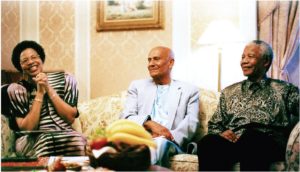
President Nelson Mandela and First Lady Graça Machel meet with Sri Chinmoy on 20 September 1998 in New York. On 10 July 2000, President Mandela wrote to Sri Chinmoy: “During the past 30 years, countless numbers of United Nations ambassadors and staff have experienced your Peace Meditation at the United Nations. Your spiritual activities have contributed to raising the standard of humanity to new heights.”
11. Importance of meditating on the heart (MUN-265)
Question: Could you speak about the importance of meditating on the heart instead of in the mind?
Sri Chinmoy: Our philosophy gives more importance to the heart than to the mind. We are not saying that the mind is bad. Far from it! But the mind is limited. At most, what we can get from the mind is inspiration. When we meditate on the heart, inspiration turns into aspiration. And not only do we get aspiration, but we also get infinite peace, light and bliss.
12. Inner knowledge achieved through meditation (MUN-222)
Question: What kind of knowledge can we achieve through meditation?
Sri Chinmoy: It is not intellectual knowledge that we get from meditation; what we get is inner knowledge, and inner knowledge means illumination. For example, let us say last week there was no light in this Dag Hammarskjold Auditorium. But now the switch has been turned on and the hall is fully lit. Similarly, for millennia we have been in darkness. If we want to illumine the darkness that covers our body, vital, mind, heart and central being, then we need meditation. Meditation is the light switch that will illumine our existence; only it takes a little time. If we can meditate soulfully and devotedly for many, many years on a regular, daily basis, then most assuredly we will be blessed with real and abiding illumination.
13. Meditation to benefit a loved one in their world service (MUN-262)
Mrs. Noemi Kovanda: Is there any special meditation I can do to benefit my husband ?4
Sri Chinmoy: You can definitely concentrate and meditate for your husband and for yourself. For your husband, you can concentrate or meditate inside your head, or inside your heart, or right between and a little above your eyebrows, which is the third eye. You can do whatever comes naturally. Early in the morning, when he is about to go to work, it is good if you can concentrate on him. Your concentration-power will enter into him and help him during the course of his day. He is doing so many important things, and he cannot concentrate most powerfully all the time. So when the hustle and bustle of the political world enters into him, with the concentration-power that you are offering him he will be able to concentrate most powerfully and focus on what he is doing most intensely.
Then, at the end of the day, when he comes back home tired and exhausted, bringing the whole political world back into your apartment, at that time you can meditate for peace to enter into him. When he is desperately trying to rid politics from his mind and he only wants to have love from his wife and from his child, that is the time you will meditate on him for peace. At that time there is no politics, no mind; it is all heart. So concentration is needed to help him at his office during the day, and meditation is needed when he comes back home so that he can have all peace, all love and all joy with his family.
‘This question is one of four questions asked by Mrs. Noemi Kovanda, wife of the Czech Ambassador to the United Nations, on 13 June 1994.
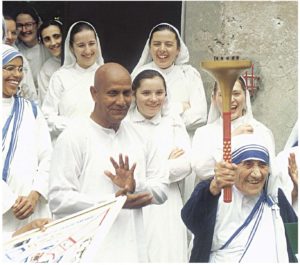
Mother Teresa meets with Sri Chinmoy on 1 October 1994 at the Missionaries of Charity House in Rome, when Mother Teresa told Sri Chinmoy, “I am so pleased with all the good work you are doing for world peace and for people in so many countries. May we continue to work together and to share together all for the glory of God and for the good of man.”
14. What diplomats can gain from meditation (MUN-83)
Question: Do you think diplomats gain anything from these prayer and meditation meetings that is particularly useful to their own work?
Sri Chinmoy: I do hope that they get peace of mind. The delegates are dealing with the world problems, so what they need first and foremost is peace of mind. When they come and pray with us and become one with us, they do feel peace of mind. Then, when they go back to their respective offices, they can solve the problems that they have been facing with new inspiration, new aspiration, new light and new illumination.
15. Sharing spiritual wealth with others (MUN-123)
Question: Does the peace that we experience during the meditations in the United Nations conference rooms have any effect on the delegates who do not attend these meetings?
Sri Chinmoy: All those who are at the United Nations have definitely come to bring about peace. When we pray and meditate here, it is not only for the seekers who attend the meeting; it is for everyone. We are all members of the same world-family. So what ever spiritual wealth we earn, we try to share with others.
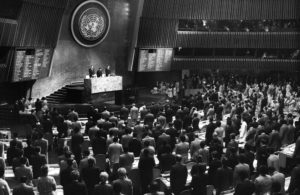
Since the earliest days, the UN General Assembly has opened and closed with an invitation to all delegates to
16. How we can best serve the Secretaries-General of the UN (MUN-88)
Question: How can we help the pilots of the United Nations – the Secretary-General and the Directors?
Sri Chinmoy: The pilots of the United Nations need our service, not our help. The moment we use the term ‘help’, a kind of egocentric idea enters into us. If we help someone, that means we are in a superior position. When we help, we feel that we are one step ahead or one step higher than the ones whom we are helping. But if we serve someone, then we offer our capacity with humility, on the strength of our loving concern and oneness. So let us use the proper term: ‘service’.
How can we serve the Secretary-General, who is the main pilot of the United Nations, and others who are high authorities at the United Nations? Let us call them the hero-warriors of the United Nations, since they are in the battlefield of life fighting for world peace, world-oneness, world-illumination and world-perfection. These members of the human family; our brothers and sisters, have gone out to fight against the undivine forces, which do not want world harmony and keep the nations of the world apart.
But we can serve the same supreme cause through our constant prayer and goodwill. Our prayers will undoubtedly be an additional strength to them while they are standing against disharmony and conflict. Our prayer has solid strength. This solid strength we can offer to them in silence, from our inner life of dedication to the world.
We have to know that even when we are meditating on others or for others, we are actually meditating for ourselves. That is because humanity is only our enlarged and expanded self.
– Sri Chinmoy
17. Meditating for ourselves or for the UN (MUN-119) 17
Question: When I meditate on my own, I take it as my own personal meditation. But I was wondering whether I should come here with the idea of meditating on the United Nations and for the United Nations?
Sri Chinmoy: Sometimes we meditate for ourselves and sometimes we meditate on others, or for others. But we have to know that even when we are meditating on others or for others, we are actually meditating for ourselves. That is because humanity is only our enlarged and expanded self. On the strength of our oneness we claim the body, heart and soul of the United Nations as our own. If we have this wider outlook and larger vision, then no matter for whom we pray and meditate, it is ultimately for our benefit since all human beings are part and parcel of one universal family.
18. Meditating on themes related to the UN (MUN-120)
Question: At our United Nations meetings, should we meditate on specific themes related to United Nations conferences as well as on general qualities like peace and love?
Sri Chinmoy: There are two approaches. Some people feel that if they can organise a peaceful outer situation, then they can have a peaceful life. They feel they have to bring the world into order before peace and other divine qualities can descend. They start from the outside because they feel that this is what will fulfil them. The second approach is to try to achieve peace, light and bliss in the inner world; only then do we feel, through prayer and meditation, that we can offer it to others.
So these are two different approaches. There is no contra diction between them. Both are aiming at the same goal: peace, love, light and bliss.
I personally feel that if we have peace, light and bliss within us, then we can more easily bring these qualities into the world at large. It is my inner conviction that politics is dying to be illumined by inner light. In the political world, quarrels and misunderstandings are the order of the day. Again, on a deeper level, politics knows that spirituality can transcend outer world-divisions. Spirituality is the flow of oneness. When there is oneness, there is no feeling of supremacy. Oneness never quarrels. So if we pray and meditate on peace, light and bliss, we will definitely be able to serve those in the political world.
If we have peace, light and bliss within us, then we can more easily bring these qualities into the world at large.
– Sri Chinmoy
19. Offering the fruits of meditation to the suffering world (MUN-206)
Question: When I meditate, I feel a flood of love and joy. But then I find that all the suffering of the world seems to well up inside me and I feel guilty for feeling joyful when so many other people are unhappy.
Sri Chinmoy: Your oneness-heart feels the suffering s of the world. Now you have to go one step further and play your role. You can share the fruits of your meditation with those who are unhappy. Suppose you have a mango. It is up to you whether you eat the mango yourself or share it. You may not want to share it because it is most delicious; but then you will feel sorry. Again, you can offer a portion of it to your dear ones or to humanity. So when you get peace, joy and bliss from your meditation, you can share it with others in silence. Sometimes they may not use it; inwardly they may find fault with it and reject it. But you can do your part by offering others the peace and joy that you get.
20. Meditation for a new flow of life energy (MUN-135)
Question: If we are feeling tired, is it still beneficial to attend the meditation sessions at the United Nations?
Sri Chinmoy: If you are tired, you should come to the meditations in order to get a new flow of life energy, new enthusiasm and new promise. Meditation is a process that awakens our dormant energy or allows us to acquire energy that right now we do not have. Meditation has the capacity to bring into our physical existence the cosmic energy that is all around us; it can supply us with constant energy. So it is always advisable to come to the meditations regularly; then you will have new energy.
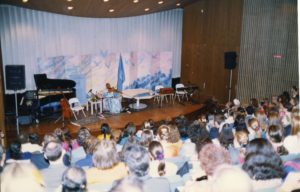
Sri Chinmoy offers a Peace Concert at the United Nations in the Dag Hammarskjold Auditorium.
21. Music during meditations (MUN-137)
Question: You have started offering songs to the Peace Meditation Group to sing at our United Nations meetings, and I was wondering if you could expound upon the purpose of this?
Sri Chinmoy: Music is a universal language; it is the easiest and most effective way for the heart to unite the inner world with the fragmented outer world. When the members of the Peace Meditation Group perform these songs, they should feel that they are offering their aspiration in the form of dedication. Those who are listening to the songs will be offering their aspiration by meditating. Meditation is a form of self-dedication that comes from aspiration.
If you are trying to aspire, soulful songs will definitely add to your aspiration. Each song is like an additional plant in your aspiration-garden. Naturally, the more plants you have, the more beautiful flowers you will be able to get.
When a soulful song is soulfully sung, it gives us tremendous inner joy, and this makes our heart expand. If we are wise, we shall use every means at our disposal to expand our heart to become one with the entire world.
22. Maintaining tranquillity at work (MUN-87)
Question: How can you maintain inner tranquillity at work when you are in an atmosphere with a great deal of pressure?
Sri Chinmoy: You can maintain inner tranquillity no matter what happens in your office or how many wrong forces from your office try to assail you, provided you feel that these forces are no match for your love of light. When you are in the office, you are constantly attacked by the force of doubt, which is a representative of darkness. If you feel that you have nothing with which to fight this force, then you are totally lost. But if you feel that inside your heart there is something called light, and that this boundless luminosity is infinitely more powerful than the force attacking you, then you have nothing to fear.
Your inner light will never surrender to the wrong forces. In fact, when darkness consciously or unconsciously enters into light, it is bound to be transformed. Just by bringing this inner light to the fore, you will see to your great astonishment that the outer darkness immediately will give way. The more you can increase your inner light and bring it to the fore through your prayer and meditation, the sooner you will see the transformation of the outer forces that are attacking you.
23. Avoiding tension while under pressure (MUN-325)
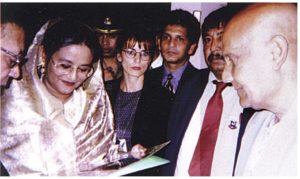
Sri Chinmoy presents to Bangladesh Prime Minister Sheikh Hasina a song he had composed in her honour, at a reception she was hosting at UN Headquarters in New York on 17 September 1999.
Question: How can we avoid tension when doing a project under pressure?
Sri Chinmoy: Before we enter into a project, we must sincerely feel that we have been given the necessary capacity to accomplish it. Then, once we undertake it, we have to bring to the fore our inner determination and inner faith. After that, in silence we must say to ourselves that the project that we have undertaken has already been done on the inner plane.
Let us take the inner plane as a higher plane and feel that we have a free access to this higher plane. Let us envision a tree right in front of us. The topmost branches, where the fruits are, we can call the higher plane. Once we climb up and pluck some fruits, we have accomplished our project on the inner plane. But this particular plane is not the plane of manifestation which is at the foot of the tree. So it is obligatory for us to climb down to reach the outer plane.
If we feel that we have already climbed up the tree and plucked the fruits and that now we only have to climb down, we will have much more confidence. From beginning to end, the one thing that is of paramount importance is confidence.
24. Detaching oneself from irritating people and situations (MUN-307)
Question: How can a person detach himself emotionally from irritating people and situations?
Sri Chinmoy: First you have to identify yourself with the person who is creating the irritation. Suppose you are in your office, and somebody is creating unnecessary problems. If you allow yourself to become angry, you will only lose your own inner strength. But if you come down to the standard of that person and identify with him, you will see that he himself is very unhappy and, therefore, consciously, or unconsciously he is trying to make others unhappy as well. The moment you identify with the person who is creating the situation, half your irritation will go away. At the same time, your presence inside that person’s ignorance will take away half the strength of his attack.
Another way to avoid becoming involved in irritating situations is to invoke peace. While invoking peace you will feel enormous strength inside you and around you. The power of inner peace is infinitely greater, infinitely more solid and concrete, than any outer situation that anybody on earth can create.
If there is a quiet corner where you can meditate undisturbed by others and bring down peace, then you can do it even in your office. Otherwise, the best thing to do is to invoke peace during your morning and evening meditations, and to keep that peace locked inside your heart to be used whenever you need it most during the day.
25. Best attitude for those who work at the UN (MUN-102)
Question: What should be the attitude of those who work at the United Nations?
Sri Chinmoy: Each individual connected with the United Nations in any capacity must be worthy of the word ‘united.’ At the United Nations we are trying to unite all the nations, to establish world peace and world harmony. This is a very lofty goal. Some people are conscious of this goal, but they do not take it seriously. Others are not even conscious of it. They feel they happen to work here just as they might happen to be at any other job. But each person who serves the United Nations in any capacity must feel that his job is a golden opportunity. There should be no fear, no doubt, no anxiety, no worry-only gratitude.
26. Working with dynamism and confidence at the UN (MUN-106) 23
Question: How can we work with dynamism and confidence at the United Nations?
Sri Chinmoy: We have to know that patience itself is dynamism; it is a mistake to separate them. In patience and in dynamism there is confidence. If the mind is inundated with confidence, if the heart is inundated with patience and if the vital is inundated with dynamism, then we can easily have a far-reaching vision of the United Nations.
At that time, we will know that we embody patience because our heart is aspiring. We will know that we have confidence in our mind because constantly the mind is striving for a higher reality than what it has already achieved. And we will know that our vital is flooded with dynamism rather than aggression because we have dedicated ourselves to serving the United Nations.
27. How those with seemingly insignificant jobs can contribute (MUN-148)
Question: How can staff at the United Nations with seemingly insignificant jobs contribute to world peace?
Sri Chinmoy: In the outer life there are significant jobs and insignificant job s, significant people and insignificant people. But in the inner life everybody is significant, everybody is meaningful, everybody is fruitful. There is no such thing as an insignificant job in the inner world. It is not the work as such, but how we accomplish the work, how we fulfil our task, that is of supreme importance.
In the inner world significant things are achieved only if we have the proper attitude, and significant workers are those who are fully awakened to the lofty messages of the United Nations.
28. How those not at the UN can best serve its ideals (MUN-118)
Question: How can one best serve the ideal of the United Nations when not working at the United Nations?
Sri Chinmoy: One can best serve the United Nations even though one is not working there by keeping in one’s heart the main principles of the United Nations. What are these principles? World peace, world harmony, world transformation and world-oneness.
29. Serving the UN through meditation and action (MUN-107) 24
Question: What is the best way to serve the United Nations: through meditation or action?
Sri Chinmoy: There is no basic difference between soulful action and soulful meditation. At times our mind separates action and meditation. But we can easily convince the mind by reaching a certain height with our morning meditation and by reaching the same height through our actions during the day. What we call meditation in the morning, we call dedicated action during the day.
30. Progressive acts towards world-oneness help the UN (MUN-29)
Question: Does any small, progressive act towards world-oneness anywhere on earth improve the United Nations?
Sri Chinmoy: Certainly it does. If there is any progress in any corner of the globe, the fruits of that progress will come back to its ultimate source.
The peace, harmony and oneness that all the countries in the world are working for have their source in the United Nations. So if there is any marked progress in the world, we have to feel that the inspiration and aspiration behind it, plus the original vision, originated here at the United Nations.
And, whenever and wherever an iota of oneness-progress is manifested in the earth-consciousness, the United Nations gets the result. For it was here that the vision of oneness took birth and sent its illumining light to the four corners of the globe.
31. What the UN needs most today (MUN-31) 25
Question: What does the United Nations need most today?
Sri Chinmoy: The United Nations has many, many, many good qualities. But inwardly I feel that the United Nations can have infinitely more confidence in its inner existence. It needs the confidence to depend not so much on world support as on its own inner strength – on what it has and what it is.
The soul of the United Nations has everything that the world needs and everything that the world will ever need. By borrowing and borrowing from the outer world and seeking moral support from the outer world, the United Nations cannot proceed towards its supreme destination. It is the inner confidence of the United Nations that can and shall eventually transform the face and fate of the world.
32. Member States and the organization within the UN (MUN-54)
Question: Do you think it is possible to change the organisation of the United Nations without changing the Member States? If so, of what use would be the existence of such a closed circuit?
Sri Chinmoy: It is not necessary to change the Member States in order to change the organisation or structure of the United Nations. We can say that when there is a large body or group, within it there has to be a smaller body to organise everything. If all the countries were equal and everybody held the same status, then there would be no organisation. This kind of hierarchy is not a matter of the strong lording it over the weak; it is only an organisational necessity. If we build a house, we need an architect and also a few workers. If everybody does the job of the architect, then there will be no workers to build the house.
In an organisation as big as the United Nations, some countries have to shoulder more responsibility than other countries, so naturally they will have a greater voice. If everybody had light, then earth would be Heaven itself. But this is not the case. Some countries do have more light than others. Again, even the countries with more light should become more sympathetic and develop greater oneness with the countries that have less light. That would be the ideal situation.
33. System of “one country- one vote” (MUN-57)
Question: Do you think that the system of “one country – one vote” is democratic? If not, do you see any alternative before the time arrives when the accumulated wisdom of nations’ souls becomes the yardstick in voting?
Sri Chinmoy: It is always advisable for each country to have a vote, but this vote should not express its individual will but rather grow out of the general will. Otherwise, it will be like many minds going in many ways. At that time, nothing will be settled and there will be no hope of reaching any conclusion. So the unity of the collective reality has to voice forth, with each country participating. Then there will be one united vote, one will, one reality and one illumining and fulfilling choice.
34. Making decisions on controversial issues (MUN-58) 26
Question: Here at the United Nations many decision-makers have to take positions on controversial issues. What is the most effective way to make sure the position they take is the correct one?
Sri Chinmoy: When a controversial subject is being discussed, unfortunately, all those who are participating may not care for constant and conscious self-giving to a higher ideal or to an uplifting cause. Still, one thing we can try to do is to exercise the sympathy of fellowship. When we look around us at a meeting, we see quite a few individuals. If we can claim them to be our friends rather than strangers or adversaries, then the strength of our oneness itself is a divine achievement.
If I am really one with somebody, then I cannot hurt that person. The parts of our body are one with each other. Our hands are so powerful, but do we strike our eyes with our hands? No!
We know that our eyes and our hands are working together to reach the same goal. So each member plays its role.
When an individual who is sincere and truth-loving offers a good suggestion, if others have any feeling of sympathy, concern and oneness with him, then automatically they will see the value of his suggestion. It makes no difference who sees the truth first; once the truth has been seen, the inner decision is already made. And while others are participating in or becoming one with the decision, they are also expediting it. So if each member can accept every other member as a real friend, eventually all will be travelling together to the same destined goal.
An illumined mind founded upon a loving heart can not only put an end to war but also expedite world-oneness, world-perfection and world satisfaction.
– Sri Chinmoy
35. Why progress at the UN seems so slow (MUN-69) 27
Question: Why is progress at the United Nations so slow?
Sri Chinmoy: Progress is slow not only at the United Nations. Human progress everywhere is generally slow, slower, slowest. Again, so long as we see an iota of progress in an individual or in a country, we must be thankful. Even if progress is slow, as long as it is also steady and fulfilling, then we know that we will eventually reach the goal.
36. Comments on the UNESCO constitution (MUN-70) 27
Question: The Preamble of UNESCO’s constitution states that wars begin in the minds of men, and it is there that they have to be eradicated first. I believe that the minds of men are changing, yet a general war is still a possibility. Would you comment?
Sri Chinmoy: It is true that wars begin in the minds of men. But the mind will change only when it is transformed, and the only way to transform the mind is to bring the reality and divinity of the heart to the fore. The mind of humanity is changing, true, but it is going at the speed of an Indian bullock cart. At any moment the storm of doubt and the hurricane of jealousy can stop humanity’s mind from proceeding further. Only if the heart’s qualities come forward and illumine the mind, can we be free from doubt-storm and jealousy-hurricane. An illumined mind founded upon a loving heart can not only put an end to war but also expedite world-oneness, world-perfection and world-satisfaction.
37. Conveying the UN ideal to one’s home country (MUN-13) 28
Question: How can the delegates at the United Nations best convey the ideal of the United Nations to the people in their country?
Sri Chinmoy: The delegates can best convey the ideal of the United Nations to the people of their country by making them feel that their own country is a solid branch of the United Nations reality tree which is destined to bear all-nourishing, all-energising fruits.
38. Supreme role of each nation vis-a-vis the UN (MUN-25) 28
Question: What is the supreme role of each individual nation vis-a-vis the United Nations?
Sri Chinmoy: The supreme role of each individual nation is to maintain a genuine faith in the United Nations and implicitly abide by the United Nations Charter
39. What the UN needs most from Member States (MUN-47) 28
Question: What does the United Nations need most from the Member States?
Sri Chinmoy: The United Nations needs most from the Member States a true sense of compassion in the inner world and a true sense of cooperation in the outer world. The sooner the Member States become more self-giving and more cooperative, the sooner world harmony, world peace and world-satisfaction will come into being.
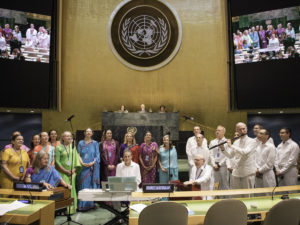
The Peace Meditation Choir offers songs of peace composed by Sri Chinmoy at the UN High-Level Forum on The Culture of Peace convened in the General Assembly Hall by the President of the 71,t Session of the General Assembly, H.B. Mr. Peter Thomson, in cooperation with Ambassador Anwarul Chowdhury and The Global Movement for The Culture of Peace, 7 September 2017.*
*The Declaration and Programme of Action on a Culture of Peace was adopted by the UN General Assembly on 13 September 1999, spearheaded by Bangladesh Ambassador Anwarul K . Chowdhury, who chaired the consultation process and promoted The Culture of Peace subsequently as UN Under-Secretary-General and High Representative.
40. Being patriotic and still loving all countries (MUN-90)
Question: How can we be patriotic without separating ourselves from other countries?
Sri Chinmoy: According to my experience and my capacity, I have built a house. According to your capacity, your talent, your aspiration and your determination, you also have built a house. Let us take each house as our own beloved country. I shall not criticise or belittle your home. I will not say that mine is far superior to yours. I will feel that mine is good for me and yours is good for you. I will keep my house dean, and if you want to come, I shall welcome you as a divine guest and invite you to stay as long as you want to. I also will expect you to keep your house dean and welcome me when I want to visit you. At that time our aspiration, capacity and ability will come together; but your home will remain your home and my home will remain my home.
If we really love something, it means that we also have the capacity to love something else. Love is a kind of expanding capacity. Today I love my mother and my father, the day after tomorrow I love my brothers and sisters. Then, when I go to school, I love my teachers. Gradually, I learn to love my town, then my province, then my country, then the whole world.
When I love my country first, my love-power never becomes stagnant; it is always running like a river flowing towards the sea.
And, if I really love my country, then I will be able to love other countries, because I will come to learn what a country means to its citizens.
For a child, his mother is the whole universe. Then, as he grows older, gradually his vision increases. That does not mean that he loves his mother less, but inside his mother, little by little, he learns to see the whole world. Similarly, inside the heart of your country you can see the existence of all other countries.
41. What qualities to offer the UN to best fulfil it (MUN-95)
Question: What qualities can we offer to the United Nations to best fulfil it?
Sri Chinmoy: The two most important qualities are concern and self-giving. When we look at the body of the United Nations, we will look with our concern; we will see that humanity is depending on the vision of the United Nations to lead it to greater progress. And when we think of the inner reality of the United Nations, we have to feel that its fulfilment can take place only on the strength of our own self giving. We have to give ourselves to the vision and the goal that the United Nations has placed before us: world peace, world harmony and oneness-light.
We have to give ourselves to the vision and the goal that the United Nations has placed before us: world peace, world harmony and oneness-light.
– Sri Chinmoy
42. How the UN can offer greater inspiration to humanity (MUN-28)
Question: How can the United Nations offer greater inspiration to the aspiring seekers in humanity?
Sri Chinmoy: The United Nations can best inspire not only the aspiring seekers but also the aspiring countries of the world by developing more sympathy and more oneness with them.
43. Order of urgency or priority of today’s problems (MUN-19) 31
Question: In general, what is the order of importance, urgency or priority today of mankind’s problems – economic, social, political and religious – and why?
Sri Chinmoy: According to me, the order is religious, political, social and economic. Why? If people are religious, they will try to lead a better and purer life, which is what the world needs most. Next is political. Politics governs the mind, the vital and the body of mankind. As religion mainly deals with the heart and inner feelings, politics deals mostly with the organising mind, the energising vital and the alert body. Then comes the social. After religion has touched the heart and politics has touched the mind, vital and body, then there should be amity and friendship in the society. At this time the individual is becoming collective. After an individual establishes his oneness with others, he feels their needs as his own. At that time, economic problems will be solved to a great extent.
44. Religion’s role in achieving a world of oneness (MUN-414)
Question: Can religion help mankind achieve a world of true brotherhood and love?
Sri Chinmoy: Yes, but one has to know what religion is. Religion is a code of life that connects each of us with the rest of humanity. If we feel that our life has a special connection with others’ lives, then only can we eventually achieve oneness with others. First, we have to feel an inner connection; then only can we think of establishing our inseparable oneness with others.
Once you establish your oneness with the rest of the world, naturally you will see inside you and around you brotherhood and love.
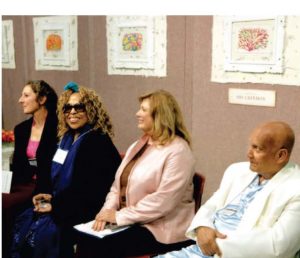
The opening reception of an exhibition of Sri Chinmoy’s “Paintings for World Harmony” on 3 April 2006, one of many exhibits of his artwork held at UN Headquarters over the years. On the dais with the artist are [from left to right] Ranjana Ghose, Curator of the Sri Chinmoy Jharna-Kala Art Foundation; Addwitiya Roberta Flack, six-time Grammy Award winner; and Vijaya Claxton, Master of Ceremonies.
45. Mutual understanding and respect between religions (MUN-423) 32
Question: Is mutual understanding and respect possible between the different religions of the world?
Sri Chinmoy: It is not only possible but practicable and inevitable. If there is no mutual understanding, then there can be no respect. Mutual understanding and mutual respect go together.
Each religion has to realise that in order to be complete, perfect and whole, it has to feel its presence in the heart of all the other religions. Also, each religion has to feel that it is only a branch and not the whole tree. The tree is God or Truth. Some religions do not believe in God or find it difficult to reveal the existence of God, but they do believe in the existence of Truth. There is no religion on earth that does not believe in the existence of Truth. So, if a religion believes in the existence of Truth, that is more than enough. This Truth-existence is the Reality-tree of life on earth. If Reality is a tree, then naturally it will have a few branches, and each branch is a different religion.
46. Spirituality can help those serving humanity (MUN-86)
Question: How can the knowledge of spirituality help professional people in their efforts to serve mankind through their work?
Sri Chinmoy: First of all, let us try to know that spirituality is not something abstract and uncertain, something that encourages us to leave the world, something that is only for the chosen few. No! Spirituality is certainty itself; and, if it is true spirituality, it always encourages us to accept life. Spirituality is the simplification of life, not the rejection or negation of life.
Each individual has something to do here on earth, so he consciously or unconsciously throws himself into multifarious activities. He wants to get everything done sooner than at once so that he can go on to something better, something more illumining and fulfilling. There is a direct route or short-cut that an individual can follow to reach his destination. This is the way of concentration, which is the first rung in the spiritual ladder. If we can concentrate before each undertaking, we will not only simplify our task but also expedite a satisfactory result.
It is like this. All along the route to our destination are doubttrees, insecurity-trees, hesitation-trees, anxiety-trees and worry trees. They are lying across the road blocking our path.
Concentration clears the road of these obstacles. It transforms doubt into faith, insecurity into security and so forth. Everything discouraging becomes encouraging and helpful as we move towards our destination. And that is only the first step. After concentration clears the road of confusion, meditation will purify and illumine our mind so that we see that the goal is not only right in front of us but also within us. This is the second rung of the ladder.
So, if we want efficiency and perfection in our profession, then spirituality is the only answer. No matter what we want to achieve from life and in life, spirituality can help us.
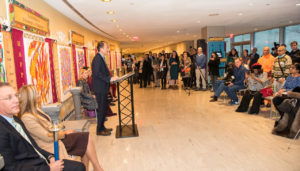
Opening reception of an Exhibition of Sri Chinmoy’s paintings on display at UN Headquarters in New York from 19 March-6 April 2018, kindly sponsored by the Permanent Mission of the Kingdom of Bhutan to the U,N in cooperation with the Jharna-Kala Art Foundation. The exhibit was in honour of the “International Day of Happiness,” an initiative inspired by the King of Bhutan, in which the UN General Assembly declared 20 March each year as the International Day of Happiness.
47. UN as a spiritual or secular reality (MUN-63)
Question: How much of the United Nations is a spiritual reality and how much is a secular reality, or are these meaningless distinctions?
.Sri Chinmoy: We can use the term ‘spiritual’ in a broad sense to mean the reality that unites all human beings and all human aspi rations. The goal of the United Nations is to unite all nations and peoples. Real spirituality cannot be other than this: to see all human hearts and all human lives united in one supreme cause.
We can use the term ‘spiritual’ in a broad sense to mean the reality that unites all human beings and all human aspirations.
– Sri Chinmoy
48. UN’s role in the spiritual transformation of humanity (MUN-74)
Question: What role will the United Nations ultimately play in the spiritual transformation of humanity?
Sri Chinmoy: The ultimate role of the United Nations in the spiritual transformation of humanity, according to my inner feeling, will lie in its recognition of the importance, the necessity and the capacity of spirituality. Spirituality carries the message of peace and has the capacity to bring about peace all over the world. Spirituality here means the discovery of our inner oneness. If we do not discover our inner oneness first, then we will never be able to discover, realise or manifest the outer oneness through politics or any other means. Spirituality is the foundation; if there is no foundation, the house will collapse.
Our inner oneness we will discover not with the mind but with the heart. The inner world is the world of the heart and the outer world is the world of the mind. Ultimately, the outer or mental approach will have to surrender to and become one with the psychic or inner approach. So first we have to discover and establish our heart’s oneness through spirituality, and then this oneness-discovery and achievement must be brought to the fore to establish peace and harmony in the outer world.
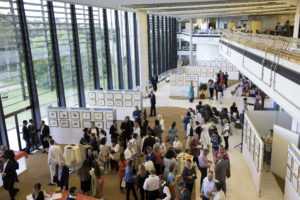
Several hundred of Sri Chinmoy’s “Paintings for World Peace and Harmony” were on exhibit from 6 to 16 June 2017 at the Palais des Nations, the United Nations Office at Geneva. The exhibit was sponsored by the Permanent Mission of Bangladesh in Geneva, with support from the Cultural Diplomacy and Outreach Section of the UN Office at Geneva, in collaboration with the Jharna-Kala Art Foundation
49. UN as both political and spiritual (MUN-77)
Question: As the United Nations evolves, will it become less of a political centre and more of a spiritual centre?
Sri Chinmoy: We have to know that the United Nations has to be both divinely political and truly spiritual. When it is truly spiritual, it will embrace humanity’s entire inner existence. And then it will need an opening to express itself. This opening is politics. The divine politics, which is inside the devoted hearts of the individual nations, can at that time be of great assistance.
The United Nations has already obtained considerable spiritual power. Unlike political power, spiritual power works in silence. Therefore, it is not noticeable to our human eyes. But it is constantly being felt in the hearts of those who are crying for a better, more illumining and more fulfilling life on earth.
50. UN as a nucleus of worldwide spirituality (MUN-78)
Question: Is it possible that the United Nations will one day be a nucleus of worldwide spirituality?
Sri Chinmoy: That is not only possible but also inevitable. The symbol, the truth, the light that the United Nations embodies are bound to cover the length and breadth of the world. The body and form that the United Nations now has may not last. But
the reality that is behind the United Nations, the dreams that each dedicated individual member has have to fulfil themselves. It may take fifty, two hundred, or four hundred years, but the dreams must eventually be fulfilled.
The League of Nations was a dream. It no longer exists.
Instead, it has blossomed into another dream, a greater dream. The United Nations is also a dream. And this dream also will eventually take a better and more fulfilling form; at that time it will be a ‘Oneness-World’.
Even when a Oneness-World is established, there should be a continuous aspiration to go beyond, beyond, beyond. Inside the Oneness-World we shall sing the song of self-transcendence, world-transcendence and universal transcendence. Only then shall we find satisfaction-perfection.
Click here to open or download the pdf format of the 50th anniversary publication of 50 selected answers to questions: The Vision of the United Nations: A Oneness-World-Family, Part 1.
